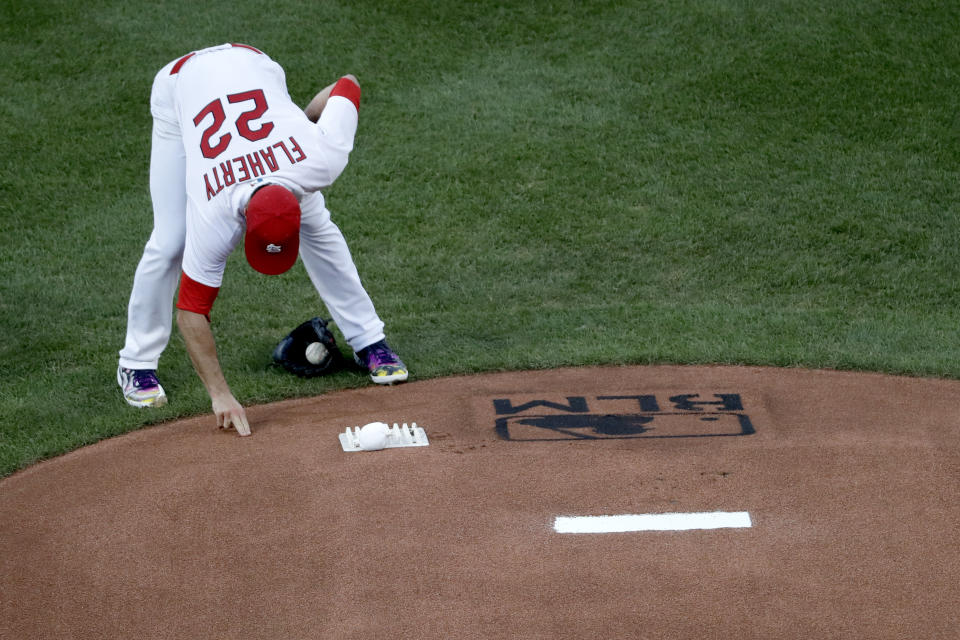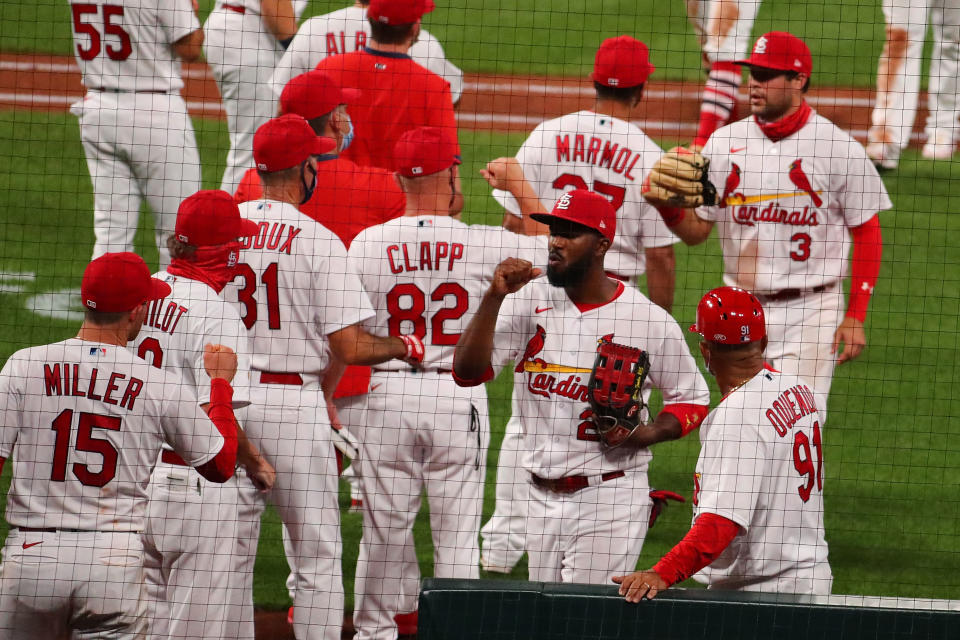Amid a day of racial injustice protests in MLB, Jack Flaherty calls for greater unity
Jack Flaherty, a 24-year-old Black man who seems passionate but ambivalent about being thrust into the role of spokesman by virtue of his willingness to be honest in public and the schedule that has him available to reporters via Zoom, wants a couple of things: To better understand the specific actionable steps he can take to combat racism in this country, and for Major League Baseball to put up a unified front.
The first is a lifelong undertaking without a clear rubric, but Flaherty — the St. Louis Cardinals’ young ace — is willing to put in the work. He’s been talking to players around the league and in other sports. Educating himself via activism and activists in the NBA and WNBA. He regrets that he hasn’t always taken opportunities to effect change. He wants to march on Washington with his friends, but he can’t leave his team right now because of COVID-19 protocols. He wants to be more involved with New York Mets slugger Dom Smith’s charitable organization. He’s participated in events for it twice, but he could go more. No excuses next time. He wants to start something of his own in St. Louis, he just doesn’t know what it is yet.
“I’m frustrated that I don’t know what it is,” Flaherty said. “It sucks that that’s still my answer.”
The unity thing, though, that should have been easier.
Coming in a statement from the league about how “Major League Baseball remains united for change in our society” unity sounds sort of like an empty buzzword used to gloss over the violence of police brutality against Black people. The idea of sameness eliding the very inequality that merits protesting.
But the aspiration of unity, and the solidarity contained therein, suddenly becomes imperative when it’s placed in contrast to standing alone as a Black player on a white team, in a largely white sport, that chose not to walk out of their games the past two days.
No league-wide action in MLB
What the Milwaukee Bucks did on Wednesday, walking out of a scheduled playoff game to protest the police shooting of Jacob Blake and the continued national indifference to the mistreatment of Black people at the hands of law enforcement, was incredibly brave. They took a real risk, combined a calculated lashing out of uncontainable despair with definitive action and a direct statement targeting the Wisconsin legislature.
That they were joined in their abstention by the remaining players in the NBA’s bubble showed the strength of collective action — athletes are the labor and the product and the marketing arm of basketball all wrapped into one. The leverage over a lucrative industry is theirs alone, and they are right to flex it. That they were met on their platform by the league itself, however mollifying that may be, is a sign of progress. The WNBA, as they have repeatedly on issues of social justice, organized an even more evocative demonstration. Forcing the postponement of their games as well, but not before arriving in shirts that featured seven “bullet holes” in the back, memorializing where the police shot Blake in front of his children, according to Blake’s lawyer and family.

When the demonstration jumped to Major League Baseball, the Milwaukee Brewers made a bold statement about how the capacity for pain and the willingness to act on it is not limited to the predominantly Black, politically more progressive NBA. Their decision to walk out on their game was ratified by the Cincinnati Reds and echoed repeatedly over the past 24 hours as games around the league were postponed. Teams issued joint statements with their rivals, Los Angeles Dodgers stalwarts stood alongside Mookie Betts and vowed to not play until he was comfortable doing so. Managers spoke of deferring to their clubhouse and achieving unanimity. Behind closed doors, the importance of getting on the same page was reaffirmed.
“But it wasn’t a league-wide thing,” Flaherty said.
A handful of players, all Black, walked out of games that were played without them. The Cubs’ Jason Heyward gave his teammates his blessing to leave him singled out, which ironically was a far greater display of support than what they showed him. The Colorado Rockies’ Matt Kemp wrote on Instagram that he “could not play this game I love so much tonight knowing the hurt and anguish my people continue to feel.” Flaherty and Dexter Fowler from the Cardinals were announced as healthy scratches Wednesday night.
In New York, Smith knelt for the anthem alone and the Mets shared a photo of him, cropped of any teammates, with the caption “We are united for change.” After the game, he cried alone on camera as he struggled to articulate how hard it is to be a Black man in America, how hard it is to see that people don’t care.
“It’s tough because yesterday would have been the day for league-wide action, and it wasn’t able to happen league-wide yesterday,” Flaherty said Thursday.
A lot of that is just timing. Some games were already underway when the Bucks’ protest became clear, some were about to start. It would have been an impossible scramble to coordinate a strike across baseball. Yesterday.
“Hopefully, it could happen today,” Flaherty continued, “but it doesn’t seem like it’s gonna be able to happen today.”
The Rockies decided as a team not to play against the Arizona Diamondbacks on Thursday, expressing regret that they had not walked out alongside Kemp on Wednesday. That as the Diamondbacks, in turn, announced that they were prepared to play. The Mets managed an entire mini-drama behind the scenes before taking the field alongside the Miami Marlins for 42 seconds of silence only to exit again without playing.
Six teams that played Wednesday were off Thursday. The Houston Astros and Los Angeles Angels have been sidelined by Hurricane Laura since the start of the protests. And the Cardinals, who played on without Fowler and Flaherty on Wednesday, staged a doubleheader against the Pittsburgh Pirates on Thursday (who also didn’t sit out any games over the past two days).
Flaherty alluded heavily to how there had been a campaign among some players to take unified action on Thursday, but that conversations revealed some players were “just not feeling fully supported, and continuing to get asked, ‘Well, why do you want to sit? Why? Why should we not play today?’
“It sucks because you’d love for it to be a unified thing.”
‘There’s not a lot of us in this game’
Flaherty said that he supported his teammates playing without him last night. He deleted a pair of tweets pointing out that the NHL postponed their games today en masse, while MLB continued an ad hoc approach. Those tweets, he later tweeted, had “put my teammates in a bad position.” But once again he chalked it up to the lack of a “league-wide unified statement.”
There were a number of powerful moments in baseball over the past 48 hours. Many felt raw and powerful in their spontaneity. But it’s worth considering, conversely, the power in organized unity. Especially when the effect of the disjointed response was often to highlight how few Black players there are in the game — 7.8 percent of opening day lineups this year.
“There’s not a lot of us in this game,” Flaherty said. “There’s not a lot of us in the game to try to make a statement together.”

Passive support, from the league or the teams that chose not to take collective action, looks a lot like granting permission for their players to be anguished beyond interest in a baseball game — an almost condescending capitulation to that which they could not have controlled anyway.
It reduces violence against unarmed Black people to a niche issue instead of elevating it as a human rights abuse. It confirms that being emotionally affected by videos of extrajudicial violence is the kind of thing that white people can opt into and out of depending on the convenience of the particular moment.
Let’s be clear: The sacrifice on the line was simply having to make up a game as part of a doubleheader at a later date. It was never going to be a forfeit, all sports leagues are smarter than that. And at seven innings apiece, what’s another one of those this season anyway? What if your teammates or leaguemates or fellow humans make clear that at stake is a referendum on their personhood?
Flaherty also spoke about how he’s “sick and tired of there being conversation, but nothing going on, nothing happening, no changes being made.”
He’s done with just being outspoken and ready to take action.
Shortly after his comments, the Players Alliance, a consortium of 100 Black professional baseball players formed earlier this year of which Flaherty is a member, announced that its players would be donating their salaries from Aug. 27 and 28 — which is Jackie Robinson Day around MLB this year — to combat racial inequality and aid the Black community.
Hopefully, that’s the harbinger of a unified, league-wide commitment.
More from Yahoo Sports:

 Yahoo Sports
Yahoo Sports 
